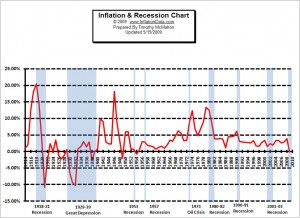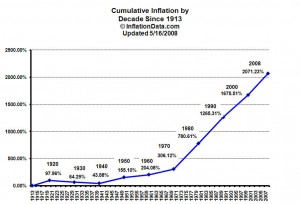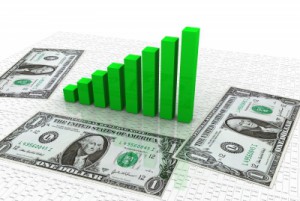How does Inflation and recession correlate? Current Commentary Does high inflation correspond with a recession? Or does high inflation precede a recession? This chart shows the historical average Annual Inflation rate (red line) compared to the time periods where the country was in recession (blue shaded areas). Since 1914 there have been eight recessions. Three lasted for a single year, (in 1953, 1957 and again in 1990). The longest recession was actually the "Great Depression" which lasted ten years from 1929 to 1939. … [Read more...]
Inflation vs Consumer Price Index – Do you know the difference?
Many people are confused by the difference between Inflation and the Consumer Price Index. The Consumer Price Index is as its name implies an index, or “a number used to measure change”. The Consumer Price Index (CPI-U) The government chose an arbitrary date to be the base year and set that equal to 100. Currently that date is 1984. (Or more accurately the average of the years 1982-1984) previously the base year was 1967 (they change the base year every once in a while so you don't notice that there has been over 2000% inflation since the start). See Cumulative Inflation Since 1913. Every month the Bureau of Labor Statistics (BLS) surveys prices around the country for a basket of … [Read more...]
What Causes Inflation?
Inflation Cause and Effect I often receive letters from students, that demonstrate a fuzzy understanding of inflation and its causes. Unfortunately, I often get the same type letters from teachers and business people too! It seems that people often confuse the cause of inflation with the effect of inflation and unfortunately the dictionary isn't much help. As you can see in my article What is the Real Definition of Inflation? the modern definition of inflation is "A persistent increase in the level of consumer prices or a persistent decline in the purchasing power of money..." In other words according to this definition inflation is things getting more expensive. But that is … [Read more...]
What is Deflation?
Define Deflation: In common usage deflation is generally considered to be "falling prices". But there is much more to it than that. Often people confuse deflation with disinflation or with Depression (as in "the Great Depression"). These three terms are related but not synonymous. According to Investorwords.com the definition of Deflation is "a decline in general price levels, often caused by a reduction in the supply of money or credit. Deflation can also be brought about by direct contractions in spending, either in the form of a reduction in government spending, personal spending or investment spending. Deflation has often had the side effect of increasing unemployment in an economy, … [Read more...]
Cumulative Inflation by Decade
How Much Inflation have we had since 1913? Just like compound interest compound inflation grows faster and faster. The average annual inflation since 1913 is "only" 3.42%. But as you can see from the chart to the right compounding something for almost 100 years at 3.42% will result in over 2000% inflation. A 2071% increase is a hard concept to grasp so to put it another way, something that cost $1.00 in 1913 would cost $21.71 today ($1 + $20.71 inflation). Or conversely a dollar today is only worth 4.8¢ in 1913 dollars. In other words the government over the years has stolen 95.2¢ out of every dollar. … [Read more...]
How can we have Inflation and Deflation at the same time?
In common usage, deflation is generally considered to be "falling prices" while Inflation is "rising prices". Actually this is "price inflation" as opposed to "monetary inflation". For more information see What is Deflation? and What is Inflation? and Inflation Cause and Effects. So if inflation is rising prices and deflation is falling prices, how can prices rise and fall at the same time? Somehow that seems counter intuitive. Obviously, when the Bureau of Labor Statistics comes up with the Consumer Price Index it is either higher or lower than the month before so we have inflation or deflation. But that is the number for the whole economy, it includes over 10,000 items and … [Read more...]
Money Supply and the Inflation Rate
Dear Editor, I found your web site as I was doing some in depth research on inflation. In looking at the CPI published by the Federal Reserve Bank of Minneapolis you'll notice three columns. The column on the right shows the "Annual Percent Change (Rate of Inflation)" which appears to be the one you publish on your web site. However, if you do the math and take the years 2006 & 2007 as an example, you'll see that in 2006 the CPI (center column) was 201.6. If you then add 2.9% (right column) you get 207.3 (center column) for 2007. The column on the right merely reflects the percentage of change over the previous year and is not the true inflation we're having. According to the … [Read more...]
How does the “Falling Dollar” and the exchange rate affect Inflation?
With all the recent talk about the "falling dollar" will that affect the inflation rate? Let's start with the basics. 1) Price inflation is primarily caused by monetary inflation. In other words as the money supply increases things cost more. See What is Inflation? for a full explanation. 2) The government controls the money supply to a certain extent through tightening or loosening credit. 3) The economy is extremely complex and many other factors come into play. Such as international exchange and the supply and demand for goods and services. At first blush it might appear that the falling dollar would cause deflation because the dollar is going down. But if the dollar is … [Read more...]
Define Inflation: What is Inflation?
What Is the Real Inflation Rate?
I recently received the following question: Please explain to me how my cost of living can increase by 10-15 percent, grocery bills, fuel, energy, clothing, etc. yet my income only increases about 2-3% which typically matches inflation. I have talked to many people about this and a lot of folks feel the same way, how can inflation only be 2-3% when the cost of living keeps going up 4-5 times that number. I am a college student, but only in my first few years so please explain this in basic terms so that I may understand. Thank you tremendously, Jessica This is a common question-- often, it is phrased as "What is the real inflation rate? Who do I believe?" … [Read more...]





